
This review may contain spoilers
No Oldboy, but that's ok.
Park Chanwook turns the page and leaves behind the mechanisms of revenge to tell of a different kind of love within the bare walls of an asylum. Our spoiled eyes recognize the extravagant cover that could only come from Mr. Vengeance, but the content offers nothing more than lighthearted entertainment.In the full conviction that she is a cyborg, half human, half machine, young Younggoon (Lim Sujeong, A Tale of Two Sisters) burns herself badly while trying to recharge her batteries. She is sent to an asylum where she chats with the soda machine, goes on hunger strikes and instead of eating the institutional food, licks batteries to regain her strength. The staff tries everything from electric shocks to force-feeding through the nose, without much success.
But then she meets Park Ilsun (South Korean megastar Rain, Speed Racer), a male patient who, after being gang-raped in the army, sewed his anus together and now hops around like a rabbit. Hoping to take advantage of Ilsun’s kleptomania, Younggoon persuades him to steal her ability to feel sympathy so she can destroy the evil doctors surrounding her, something to which Ilsun agrees and he learns the rules of her strange world in the hope of giving her back her appetite.
Having completed his sweet revenge trilogy, which included the masterpiece Sympathy for Mr. Vengeance, the downright leaden Oldboy, and the visual candy Lady Vengeance, Korean director Park Chanwook leaves his dissection of the mechanisms of revenge to step into the world of fantasy, where just about anything can happen. With the revenge trilogy box set on the table, it is easy to call the comedy I'm a Cyborg... a career step into a completely new path for the director who usually draws such dark brushstrokes, when everything is pastel-colored and the humor is largely farcical. But if there is something that characterizes Park Chanwook's films, it is his way of unabashedly crossing genre boundaries and then of course the visual playfulness, and we get both here.
Because of course he would never settle for a film that didn't look outrageously good, we are dazzled right from the usual ape-like opening credits camouflaged among all the electronic equipment and props in the film's Metropolis-flirting opening sequence in a factory environment, to the moments of visual effects magic that occur when we get to follow into the head of a Cyborg among machine guns, alpine peaks and giant ladybugs. In the world of dreams, you get the feeling that Park Chanwook has discovered Michael Gondry. But despite this, the story, framed in such an exclusive and expensive gold frame, would do just as well as a stripped-down theater play on a bare stage in the nearest high school auditorium. We understand quite quickly that even crazy people in a crazy world need love, so unfortunately 107 minutes of detours around the subject become a bit tiring.
I found myself sitting unengaged waiting for someone to get their teeth pulled, because if we're being honest, it's my understimulated eyes and my repressed bloodlust that have been longing for more Park Chanook impressions on the big screen, not my hopes of seeing a new One Flew Over the Cuckoo's Nest or that the girl's favorite Rain would turn out to be some new McMurphy. I've seen enough Korean comedies to realize that it's not my cup of tea, that humor can be experienced as very strange and infantile by the uninitiated, and so it is here. The gaps between the small flashes of brilliance become too large in this witty and petty love story that hardly violates the extravagant visual style that has become Park's signature, but unfortunately forgets that we have to keep our eyes open to experience it.
Was this review helpful to you?
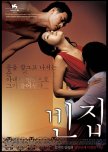
This review may contain spoilers
Dream or reality?
What if the scale no longer showed reality? What if it showed 0? What do I weigh then, when I step on the scale and it shows that my weight is 0? Is it a dream or reality?Tae Suk breaks into strangers' homes to stay there for a day or a night. He never steals, occasionally he moves a painting or changes something of minor importance, but he always repays the hospitality by fixing small things, doing the laundry or cleaning. One day, no more remarkable than any other day, he breaks into what he thinks is an empty house. In the darkest corner of the house, Sun Hwa sits huddled, despairing and afraid that her husband will come home. Her face is bruised. When she sees Tae Suk, she watches and follows her intruder carefully. Later that night, she steps forward and shows herself. Tae Suk is surprised and moves eagerly towards the door to leave when the phone rings. That's Sun Hwa's man.
In some situations - In some encounters - Only glances are needed to communicate and understand. When two people who share a very strong feeling meet, the moment and the energy can tell everything. Such is the case for Tae Suk and Sun Hwa. They share the feeling of an incredible loneliness and in this scene take part in each other - Are sucked into each other - And escape together. Without speaking at all.
3-Iron tells the story in images more than in dialogue. A stationary camera allows the viewer to see details: The scenography, the sound and above all the faces can be interpreted and observed to a completely different extent. Here it is unbeatable. It is a kind of poetry that our Finnish master Aki Kaurismäki also expresses himself so well in, a kind of figurative and very freely interpreted poetry. You don't lose interest in a single frame, not for a single second. And without knowing anything about their background, the symbol-laden images (the film literally speaks in them) shape two characters with a lot of depth and emotion. You understand their loneliness and you understand their longing: How they need each other for their survival. That energy creates one of the most beautiful love stories I have ever seen on film.
In the end, they get caught and Tae Suk is reported for a whole series of crimes. They are separated and Sun Hwa is forced to return to her husband who is patiently waiting for his revenge. But with more courage and strength in her body – She knows that Tae Suk will be released – She manages to resist. Now it is about finding a way for Tae Suk and Sun Hwa to reunite. What drives them now is love.
To a large extent, Kim Ki Duk's film is about precisely this: What drives and motivates people. Why does Tae Suk wander around apartments, what satisfaction and what holes does it fill? Does he fill the hole of loneliness? And Sun Hwa's husband, what motivates his vengeful spirit, could it also be loneliness? And when Kim Ki Duk does it with high-strung energy and strong characters, and instead of taking the turns uses empathy and meticulous image processing – Well then it can't be anything but masterful.
FYI: The director wrote the script for the film in a month, it was shot in just 16 days and edited in 10.
Was this review helpful to you?
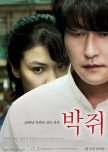
This review may contain spoilers
With a thirst for life.
A Catholic priest literally changes his lifestyle when he becomes a vampire through a blood transfusion. Old Boy director Park Chanwook updates the vampire genre in a sometimes bizarre way, which is always worth watching.Asian horror can sometimes be a little difficult for us in the West to keep up with. Local myths, legends and general folk beliefs about ghosts, small whitewashed children or women looking out from under their wispy bangs can create shivers in the East, but shrugs in the West. It is therefore interesting when Park Chanwook transfers a typically Western genre like the vampire film to his South Korea. Here the story becomes more straightforward for all of us who know the vampire codes, while at the same time he creates something completely new with the theme.
Catholic priest Sanghyeon visits an area exposed to a deadly virus as a volunteer worker. He too is infected, declared dead on his sickbed, but is resurrected from the dead thanks to a blood transfusion. Unfortunately, his bag of blood was vampire blood and the priest soon finds himself on his feet, with a new thirst for life - Literally. His thirst is not limited to blood, but also for the flesh and he tortures himself to hold back his newfound sexual desires.
Sanghyeon becomes something of a miracle man, the only one to have survived the virus, and people make pilgrimages for the hope of a cure from the priest. He realizes his need for blood, but as a deeply religious man he cannot kill for his own survival. He cunningly takes on additional volunteer work at the hospital, where he can easily drop a comatose patient on the elixir of life. Life is complicated when Sanghyeon reconnects with a childhood friend, who has practically married his adoptive sister. He begins a secret relationship with Taeju, as the scorned wife is called. She is reminiscent of Eli in Let the Right One In, delicate but powerful, while at the same time enigmatic. Their relationship gradually takes them down a dark spiral of death and bloodshed.
Park Chanwook made the stylish and at times surreal Old Boy. Thirst involves a more straightforward story, but the style is just as sure and the story vital. He also does not shy away from the slightly bizarre, as in a scene where 2 vampires suck blood out of each other as in a hungry 69 position. He also has a good touch with effects that are portioned out in a nice way without taking over, they sneak in like warts that gradually disappear or veins that form contours under the skin. But above all, the director has a comic streak that comes to the fore in the everyday problems that Sanghyeon experiences as a newly-made vampire. Yes, the fact that he is a Catholic priest is of course a difficult contradiction.
Park Chanwook has taken a genre and updated it, just like in True Blood, Twilight and New Moon, but in a completely unique way. Here you have, excuse the expression, good bites, nice ideas and good acting. But, it gets a little too long. It doesn't get scary either, scary as in built-up tension. But it's still very watchable.
Was this review helpful to you?

The new miniseries about war and samurai is a future classic.
Shôgun is the proof that it can actually be okay to make a remake of something that has already been praised and won great prizes, but then it always has to be done this amazingly well.Shôgun s a mini-series set in 17th-century feudal Japan - And begins with the English pilot John Blackthorne (Cosmo Jarvis) suddenly running aground with his ship on the Japanese coast. There he quickly becomes a pawn in a power game between above all 2 feudal lords. Both with the ambition to lead the entire country until the young emperor comes of age and can take over.
Civil war, honor, power play and multitudes of samurai account for most of the action. But the cultural clashes for Blackthorne, who quickly tries to learn Japanese through the interpreter Lady Mariko (Anna Sawai), also take up a lot of space. During this time, Portugal had already found Japan and sent Catholic priests there who began to convert parts of the Japanese elite to Catholic Christianity, while Blackthrone now comes from a country at war with Portugal and claims to have lied about everything. It simply stirs the already infected pot.
Next year marks the 50th anniversary of the release of James Clavell's book Shôgun, which is partly inspired by real events. Already 5 years later, we got one of the best and most ambitious mini-series ever in television history, when Richard Chamberlain took on the lead role of Blackthorne and Orson Welles acted as narrator for the English-speaking viewers who did not understand Japanese. This time too, most of the dialogue takes place in Japanese, but now without an explanatory voice of course.
The old miniseries was then one of the first series of its kind to show both a naked woman and beheadings (not at the same time, fortunately) on television, which then shocked many viewers in 1980. More than 30 years before Game of Thrones turned that kind of of scenes to an almost absurd level (which gave that series the nickname Tits and Dragons). But it was, of course, the exciting and very complicated story itself, which made Shôgun win the finest television award at the Emmys, for the year's best miniseries.
So, why on earth should we go in and tinker with already acclaimed TV classics? Why not adapt something completely new or come up with a really awesome original story instead? These are questions that are most often muttered when different film studios seem to be trying to grab as much money as possible, by betting on already "given" successes. Sometimes, for example, when we get a really bad film adaptation, like The Last Airbender (2010), fans can still buy that a new and more ambitious attempt is made, like the live action series Avatar: The Last Airbender (which we can now watch on Netflix).
But this thing about remaking something that was already considered near perfect to the same format again... Why? The answer to that question will from now on always be: Shôgun. This is a miniseries that proves both why and how to update something already celebrated and let a new generation share the same story, while giving those of us who have seen the original an adaptation that can realize the story in an even more impressive way.
I read the book myself, which is really the only reason why I gave the already old mini-series a chance. When it comes to movie classics from the 70s or 80s, few frown when titles like Star Wars (1977), Apocalypse Now (1979) or The Godfather (1972) come up. Catching up on the old film classics is part of it. Considerably fewer spend 10 hours on a miniseries from 1980, however, no matter how acclaimed it happened to be at the time.
The fact that filmmaking has developed somewhat enormously in the last 40 years also means that the new adaptation of Shôgun has been able to learn from other war series and films. Just like Game of Thrones could do. And this new adaptation of Shôgun looks absolutely stunning. The photography is magical and so are the actors Hiroyuko Sanada (in the role of the feudal lord Toranaga), Anna Sawai and Cosmo Jarvis.
The book and the old miniseries have long since proven that the story itself is really exciting - And luckily the adaptation of the screenplay has stayed true to its source where needed, but also made minor updates to improve it elsewhere.
I had really high hopes, but was pleasantly surprised that they even managed to exceed them. The new Shôgun miniseries is a future classic, hopefully one of those few (like Band of Brothers) that everyone from now on will look to give a chance - No matter how many years have passed the premiere.
Was this review helpful to you?
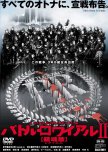
This review may contain spoilers
Excited young people on the warpath.
At the turn of the century, a new game was started by the Japanese government called Battle Royale. The game involved a class being selected each year to go to a deserted island and fight to survive. The game was for the class to kill each other until only one was left.3 years have passed since Class 9B played Battle Royale and Shuya (Tatsuya Fujiwara) has gone and become a terrorist. Shuya wants revenge on the adults and decides to start a war against the elders and the government of Japan. He has gathered friends who also played and survived Battle Royale. They blow up 2 skyscrapers (similar to the tragedy of September 11, 2001) and hide on an island off Japan. The Japanese government does not like the deed and decides to start a new game, Battle Royale 2. The game is about a class of 40 young people having 73 hours to find and kill Shuya Nanahara or the metal bands around their necks will explode.
When you look at Battle Royale 2, you see a lot of similarities to the first movie. It makes me a little disappointed because it would be a little more fun if they could vary. But that's also the only negative thing about the film. The rest of the film is like the first, very good. Great feeling and very good acting performance. Kinji Fukasaku (director) just finished filming Battle Royale 2 before he died of cancer. His son Kenta Fukasaku then took over the rest of the work to complete the film. In my own opinion, I consider Battle Royale 2 to be an outstanding movie. Maybe not as good as the first one, but not far behind. The film has the same violent elements as the first, but Kinji has managed a better plot in Battle Royale 2 than in the first and that means a lot to the film.
Something that really needs to be mentioned is the music. The music in Battle Royale 2 is wonderful. You get a feeling of sadness and anger when the different songs are played during the film. But there is also powerful music in some scenes. Such as when a group of trained soldiers appear on the island to try to kill Shuya. Firefights erupt and beautiful dramatic music pours out of the speakers. That makes me really shudder. Those of you who liked Battle Royale will like the second one. Usually when you think that a sequel is coming, you immediately get a negative attitude towards the film.
A funny scene in this movie is when Shuya and the rebels send out a speech to the world declaring war on all adults and minutes later a missile hits the island and damages some buildings. In the next scene, you find out that it is a large country in the West (the World Police) that did not like the speech and decided to do what they did best, bomb.
I recommend the movie to anyone who enjoyed the first one.
Was this review helpful to you?

This review may contain spoilers
Let the games begin!
What would you do if you were suddenly pitted against your closest friends in a fight to the death? Director Kinji Fukasaku's film adaptation of writer Koushun Takami's short story Batoru Rowaiaru is a hearty, dramatic, exciting and very well-made story that manages to touch on all levels.The year is 2000. We are in a fictional future Japan where the entire nation has recently collapsed. Huge unemployment and juvenile delinquency prevail in the country. Adults have lost confidence and fear the younger generation more and more, which leads to a new reform action being put into use by the government to overcome the problems - Battle Royale.
Battle Royale involves a middle school class being selected through a very careful lottery, kidnapped and then sent to an isolated island where they are forced to fight each other for 3 days until only 1 survivor remains.
It is with a very raw and merciless violence that the director Kinji Fukasaku depicts the central plot of Battle Royale. We follow class 9B, a group of young school students who have become like a family to each other and who are suddenly pitted against their best friends in a brutal fight to the death.
As a viewer, you quickly grow fond of many of the characters, which gives you the feeling that you are almost in their midst. The moment when the game on the island is set in motion, when each student is given a randomly selected weapon and sent out to take on each other, was in my opinion one of the strongest and most uncomfortable scenes of the film. We get to see how some react with panic and do everything to survive while others stick together and do everything they can to stop it all.
We mainly follow 3 main characters during the course of the film, primarily the students Shuya Nanahara and Noriko Nagakawa. Shuya has a difficult past that left a strong impression on him. By his side he has Noriko, a girl who has been very fond of him for a long time.
These 2 are also joined by Shougo Kawada, who participated in the game once before. He is portrayed as a somewhat erratic person. We never really know where we have him and what his intentions are. This uncertainty contributes to a very exciting and intense atmosphere between the 3 who stick together during the time they are on the island where the brutal game takes place.
The film's antagonist Kitano is played by a brilliant Takeshi Kitano (Sonatine and Outrage). The interesting thing about this character is that we get to see him in different contexts, whereby his personality changes between the situations. Kitano is initially the teacher of Class 9B under the chaotic conditions of collapsed Japan.
He is portrayed during this stage as a very inferior and fearful person who has completely given up hope for the youth he teaches. Here we get an equally clear and frightening picture of how the situation in the country has affected the adults and how the young people have now taken the law into their own hands.
When he then leads the Battle Royale where his former students participate as players, it is he who once again holds the stick, but in this context there is no trace of the submissive and fearful teacher - Here instead a completely emotional, sadistic and mentally unstable person appears, who seems capable of any number of horrors.
At the same time, during the course of the story, we learn more about Kitano's personal background and the root of his madness and callousness. Beneath the character's frightening exterior, there are nevertheless glimpses of goodness, which almost forces the viewer to feel a certain sympathy for him. Therefore, the audience is kept in a tense uncertainty about what kind of person Kitano really is.
While Battle Royale is a very exciting movie experience, it is also a very dramatic and scary story with a lot of moral undertones. Both the fantastic character direction and the, in several cases, extraordinary performances contribute to this. Fukasaku has managed to portray the plot of Koushun Takami's novel of the same title in a realistic yet frightening way and delivers a cinematic experience that you simply cannot miss.
Was this review helpful to you?
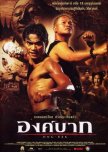
This review may contain spoilers
Jackie Chan in Thai.
For many, Thailand equals a dream vacation. For others notorious for drugs etc. The truth probably lies somewhere in between. There are many sides to Thailand: The beautiful exotic country in the far east with its amazing nature, its good food and nice, friendly and hospitable people. In any case, Ong Bak is a nice reel that offers a lot of action mixed with excitement and laughter.The opening promises well: In the annual competition in the village, all the men who participate must try to get hold of a ribbon that is at the top of a tree. First man wins. It starts off well and pretty much keeps the same fast pace throughout the film. Already there you get to know Boonting, the winner with the extra features and the athletic qualities that get through most things, even the narrowest openings, over the really high obstacles and past the less friendly competitors. Despite his speed and strength, Boonting is also humble. He has trained in martial arts for many years but has to promise his master never to use his fighting skills. Every 24 years the village holds a special festival and sacrifices to the Gods for continued joy, happiness and good harvests. The village's own saint is a Buddha-like statue called Ong-Bak. It is of course sacred and it is the duty of all the villagers to protect it at all costs. Therefore, it is a big setback when, just before the festivities, they discover that the statue's head has been cut off and disappeared. Boonting then voluntarily steps forward as the one to recapture the head and bring it home to the village.
The hunt leads to Bangkok and an old clumsy acquaintance who will do anything for money. They have barely reacquainted themselves before Boonting, in search of his suitcase, follows his host to the local fighting and betting club. To get the money back, he has to box against a number of bigger and stronger shady types. He had promised not to use his skills but now he has no choice and stands up, and of course wins...
The hunt for the missing statue head leads to more shady acquaintances and more fights. Every time Boonting is forced to fight to move forward, he thinks about his previous promise, but to get the village's property back, he makes almost any sacrifice. There are so many who are waiting to see the statue head again and he cannot let them down!
The hunt goes higher and finally he meets the top boss who runs the betting and a lot of other shady and illegal business. Ong-Bak is a fun and watchable film. In Thailand it is a great success and it has also celebrated success in several other countries where it has been shown. The pace is high and there is a good mix of tension, comedy and drama. One of the most exciting and fun scenes is when he makes his way through several blocks, away from the gang who want their lost money. An armed gang of at least 20 people do everything to stop him but fail!
There is quite a lot of action and most of it is done for real without any stuntmen or other tricks! The main actor Tony Jaa is responsible for most of the scenes himself. Ong-Bak is also very reminiscent of Jackie Chan's films. Tony Jaa has admitted in interviews that one of his idols was the Hong Kong hero Jackie Chan. He could also be compared to Chinese born Jet Li.
Was this review helpful to you?

This review may contain spoilers
A piece of epic film history.
Dark sky, gray shadows moving across the ridge. Akira Kurosawa could get top marks for Seven Samurai just because he created the legendary war scene where a troop of soldiers ride over a hill on their way to the battlefield, or because he wrote side-long backstories about each leading character and made an intricate family tree over the 101 villagers. This is an epic mammoth film, but today perhaps best suited for cineastes.The plot is simple: Japan, 16th century, feudal society - It's sweaty, dusty and bloody, especially if you're a peasant. The population of the small mountain village is constantly subjected to bandit attacks, especially in the fall after the year's harvest. The men in the village therefore decide to hire 7 samurais to protect them from the horrible miscreants. The first man to stand up is the wise Kambei, who later hires 6 more ronin. Is this incredibly exciting? Absolutely, if you're willing to spend 3.5 hours watching dramatic Donald Duck-clad men laughing at jokes no one else understands. But if you want to see who combined it first: Slow motion + young woman falls in love with young fighter + group of heroes helping each other + men on a hill, this is where you should turn.
Just the intro is a 3-minute long explanatory text passage accompanied by pompous taikos. But hold on. From the first scene you are struck by the astonishing photo. Akira knew how to use the black/white format to the max. Small details such as the characters' patterned kimonos increase the nuances and make each frame attractive. The director recorded each scene with dual cameras in order to have a larger selection of images when editing. It's noticeable, because it's a fantastic variety of angles and perspectives. Some images are so beautiful that you could frame them as individual photographs. I especially fell for the contrast of the white daisies against the dark tree trunks. The sound effects and music are also interesting. I laughed out loud towards the end when the young woman whistled for a full hall. There are creaking hinges and humming men, but it never becomes blaringly loud, instead the music and sound effects stay in the background and act as a mood setter.
Although the film is, according to some, the first drama-action film, Akira has had his heart in the right place. Unlike now, the heroes aren't nerve-smooth and pumped with anabolic steroids. Here, the men have lovely round bellies, wrinkles and they actually cry when their pals die. The masculine lies in their enormously pent-up sexual frustration and that around every corner there seems to be a woman in distress with a crying child in her arms. The young woman who has a fling with the young wanna-be samurai is the only girl who has lines. I have full respect for that because the movie is from 1954. What scares me is rather the realization of how little the genre has developed since then: Braveheart, Gladiator, Kingdom of Heaven.
Just the comparison between this and more recent drama-action films makes me understand how big an influence it must have had. Not only because it is innovative but also because the story is emotionally driven. The atmosphere breathes gloom. The only thing I miss are characters that develop this way despite Akira's solid preparatory work with the portraits. It's only the funnyman Kikuchio who undergoes a major change. Despite the massive playtime, I never get a chance to go deep with a select few. Therefore, I don't really get emotionally involved in how the villagers and samurais are doing. This also applies to the dark forces that move around the village, the bandits, they have no face. They are more like a brutal, black shadow that thunders forward and devours everything in its path.
Despite its few flaws, it is still incredibly well made and interesting from a film historical perspective, but I think it takes a cineaste to really appreciate it. If you like to Google everything about the film after you've seen it, to create an overall picture and be able to put it into context, then you're the right audience.
Was this review helpful to you?

Get on board the zombie express.
Train to Busan can best be described as a Korean clash between Snowpiercer and World War Z. The Korean thriller's zombies and special effects are world-class, but the emotional bits can get a little cheesy.I can really appreciate when the entire plot of a genre film can be summed up in one sentence. A simple and effective concept that arouses curiosity: Snakes on an airplane. A tornado with sharks. Okay... you understand that it might not be the world's best movie every time, but you know exactly what you're getting, and if you go along with those premises, you're in for a while of good entertainment.
So what happens when you put a zombie on an express train? It doesn't take long, of course, for things to go off the rails. Bloody chaos as more and more people are bitten, the survivors' fight for life and death. Being trapped with the living dead in tight spaces is never a good idea if you ever find yourself in that position. It's claustrophobic, and really rough.
The conflicts that arise among the group of people, the fear that breeds mistrust and selfish thinking, are not new. Countless Stephen King movies have explored this with what happens to ordinary people in terrifying situations. It becomes more exciting, however, when zombies have to face the danger, as when a small group of passengers have to sneak past several carriages without becoming someone's dinner.
We need to talk about the zombies! Someone may have been inspired by World War Z and its hordes of the undead, and created equally insane creatures that you don't want to share a carriage with. They are really fast, and all rabid. They're not necessarily the smartest, but good nasty designed with their sickly faces and jerky movements. Arms and legs are twisted in unnatural directions - It's hard to tell where the intense effort of the actors ends and special effects take over.
The story in Train to Busan is bigger than what takes place on the train. The news tells about something that has happened around the country. "Zombie" is trending as a keyword. It looks and feels like a big, lavish disaster thriller, which has chosen to zoom in on a few really unlucky individuals. But if it sounds loaded and gloomy, then... Well. There's a kind of cheesy B-movie humor that makes us laugh, too. The occasional goofy zombie or cocky alpha male opens up fun elements and the audience seems to love it.
At worst, the pieces are meant to be emotional, where you touch so the strings bleed. The relationship between a guilt-ridden father and his neglected daughter takes up a lot of space, and sometimes becomes unnecessarily sentimental. The film is also longer than it needed to be, with several dead transport stretches. And just when you think we're at the end, it continues with a finale that should have been better - Or in any case completely scrapped.
Watch it with zombie-crazy friends and you have a wonderful and terrifying 2-hour journey ahead of you.
Was this review helpful to you?

This review may contain spoilers
Freezing and terrifying.
Lady Vengeance appears at first sight as a strong emotional drama, seemingly almost a pleasant film. But if you just scratch the surface a little with your fingernail, you'll soon discover a print mood so unsettling you can almost touch it.For over 13 years, Geum-Ja has been imprisoned. The reason is that at the age of 19 she pleaded guilty to the kidnapping and murder of a 5-year-old boy. But the confession was not the whole truth and a burning desire for revenge now hangs in the air.
Starring Lee Young-ae performs pure magic sweetly. Her face is at times so incredibly innocent - Completely glowing with warmth and good intentions, then, in the blink of an eye, turns to a harsh emptiness, tart and defiant anger and contemptuous nonchalance.
Every frame in Lady Vengance is so well thought out that it amazes you. Small surreal details inserted with a sure hand reinforce the impression that it is a unique film. Geum-Ja's story moves easily and smoothly between flashbacks and the present, while the fates of her fellow prisoners are inserted like puzzle pieces into her detailed revenge plan. Through an incredible manipulation, Geum-Ja connects more and more people in the prison - Each one fulfills a purpose and is used just as obviously. In the prison, people begin to discern the two faces of our Lady Vengeance, as she is called Geum-Ja the Kindhearted and Geum-Ja the Witch. One expressed with warmth - The other with an involuntary respect. Because for 13 years she has successively won over, exploited and helped all the people she coldly expects to need in the future and wrapped them around her fingers. Because vengeful women banded together are capable of anything.
As a film, the action moves continuously, which helps to keep the tension razor sharp. Although it is calm and serene, there is a constant awareness that it is an apparent calm that heralds a violent storm and the air crackles more and more with charged electricity. With simple means at hand, one becomes disgusted, saddened, imprisoned, All the while one is unsure which of the faces Geum-Ja shows is her true self - Or if she even knows it herself.
What makes Lady Vengance such a remarkable film? Because it is probably not a film that suits everyone. You mustn't be too restless for this movie, you mustn't expect classy action and choreographed fights, you mustn't expect a fast pace.
The contrast is most dazzling when all the slow, beautiful stillness is set against the raw and brutality of revenge. Nevertheless, if you have seen director Park Chan-Wok's previous films Sympathy for Mr. Vengeance and Oldboy, you risk being disappointed. Lady Vengance puts an end to the director's revenge trilogy and is light years from the previous ones. It is characterized by incredibly less violence and at the same time manages to create a greater discomfort than the other films. It is closer to the Korean horror film A Tale of Two Sisters because it creeps up on you like cold ridges along the spine.
The violence we see has nothing hollywoodized about it, there is no high tech Matrix aesthetic here, it is close, harsh and leaves most to our own imagination. When a group of middle-aged people discuss weapons, draw lots for turn order, and protect their clothes from blood splatters, logical reasoning about the execution of revenge is one of the scariest things I've seen in a very long time.
If revenge is best served cold, then Lady Vengeance is perfection. Frosted so cold you get goosebumps just being near it. When you take it in, it's like swigging a whiskey on the rocks.
Was this review helpful to you?

This review may contain spoilers
An ambitious firework without a foundation.
To save Earth from colliding with Jupiter, a group of young people must work together to save humanity. Despite an enormous ambition and budget, the film is let down by one-sided characters and sometimes excruciating dialogue.The Wandering Earth is by far the biggest science fiction film made in China. Based on the book of the same name, with a production budget of $45,000,000, this is a major milestone in China's film industry.
In the near future, the Sun has begun to expand, and within a few years all life on Earth will cease to exist. Humanity then hatches the idea to build 10,000 giant mountain-like engines that will cover half the earth's surface, and turn the earth into a giant spaceship that will then fly away from the sun in search of a new source of energy. I'm not making this up.
During the flight from the sun, the surface of the earth is frozen and all the people have been moved to underground cities, but one day two young people want to sneak up to the surface and experience it for the first time since the expansion of the sun started. Suddenly, they are drawn into a rescue mission, when Earth's engines stop working and must be repaired before our planet ends up on a collision course with Jupiter.
This film is ambitious. Incredibly ambitious. We get to see everything from gigantic, detailed space stations, to frozen cities, to pictures of planets that could just as easily be beautiful paintings. It's noticeable that a lot of time and money has been spent on the production value, and it makes the whole film feel bigger than many other disaster films we've seen in Western films in recent years.
There are exceptions when it comes to special effects though. Unfortunately, the characters spend a lot of time driving around in cars, and the car chases look like they're from any playstation game from 2004. It's immediately apparent that it's 100% made in a computer, and it's eye-popping when you see it.
As ambitious as the film is, it is action-packed. It feels like they have moved away from the classic structure with three acts, and instead went straight to the third act. You start the film with a disaster, and from the fast start the film doesn't want to slow down. It is certainly something that is common in disaster films, but it would have been nice to have a couple of scenes where you can catch your breath. However, the film gets better in the second half, when the main characters come together and are given a mission that is easier to follow.
What brings this movie down is unfortunately the characters. One character is supposed to be a typical humor sidekick, but just comes across as a screaming, annoying form of Jar Jar Binks. Another should be the restrained protagonist who only sees darkness and negativity. It is hard to care about them when they are so one-sided and exaggerated in their behavior. Then add that the supporting characters spend a lot of time in their spacesuits, which makes it difficult to keep track of who is who.
Something else you could have put more love into is the dialogues. At times you might think that a beginner has written them. When our main antagonist tells his sister about the 10,000 engines and why they exist, it's clearly a conversation that exists for us as the audience to get that information. The sister of course already knows this, as it's the reason they've been living underground for 10+ years.
Unfortunately, I'm having a hard time getting into The Wandering Earth. After a bad start with subpar special effects and hard-to-love characters, I can't appreciate the huge spectacle that the second half of the film offers. It's ambitious, lavish and brave, but when I don't get a sensible human entry point, it stops at superficial fireworks instead of something deeper.
Was this review helpful to you?
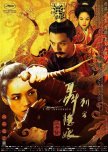
Stunningly beautiful but frustratingly slow.
If you're in the mood for beautiful artistic 9th century style, long takes and a complicated story in a slow film, then The Assassin is probably your cup of tea. If you want to see a cool martial arts movie - Watch something else.When you see The Assassin you are faced with the age-old question: What makes a good movie? Some prefer a strong story, others powerful effects. Here, a story that arouses no great interest is combined with an artistic style that is unlike anything else.
For those who follow the story, it is about a female assassin in 8th century China. Like many assassins on film, she is faced with the classic dilemma of having her loved one killed or failing her duty, something that meant slightly greater consequences at the time.
If you are looking for a juicy story, you need to have both a lot of concentration and patience, because the director Hou Hsiao-hsien is hardly someone who prioritizes pace, forward-looking lines or clear character development. We're talking sometimes forever-long takes, extremely sparse or no dialogue and scenes that work more like art installations.
Undoubtedly, it is a stunningly beautiful film. The environments, the scenography, the costumes - Almost every single frame is like a painting or the most delicious photograph you've seen on a cinema screen. One could practically watch the film without sound and admire the impressive work of the film's creative team.
With that said and the cool visual style aside, it's a frustratingly slow film to get through. As a contrast to the often overly clear film narration in, for example, American cinema, this becomes almost incomprehensible and unnecessarily complicated.
The fight scenes are the highlights - Not because it's exciting but because of the quiet and calm style. But it's still one of the most boring martial arts movies out there. It is a perfect example of "see but not feel" - Gentle on the eyes, but you leave the salon with a slightly empty and unsatisfied feeling.
Was this review helpful to you?
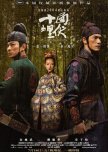
Hero director back with new spectacular action.
The Asian martial arts film has become in the 21st century what spaghetti westerns were in the late 60s. Many films take more and more from the mystical East in terms of fighting and spirituality. The pioneer for this was of course Ang Lee's Crouching Tiger, Hidden Dragon which became the first non-English language film to gross over 100 million dollars in the US. There was also an Oscar for best foreign film. The legend Zhang Yimou was not slow to follow up with the visually stunning Hero. Common to these films was also a certain Zhang Ziyi, an adorable young lady who, if Yimou can be likened to Sergio Leone, can be likened to a feminine Clint Eastwood.Now Ziyi and Yimou collaborate again in the new Flying Daggers and the result is just as good as you think. There are grand vistas, gravity-free fight scenes and a dance scene that defies description. In the beginning, we meet the police officers Jin (Takeshi Kaneshiro) and Leo (Andy Lau), who have been given a mission to find the leader of the rival group Flying Daggers. They hear that a new suspicious girl (Ziyi) has started at the local joy house and head there to investigate. Soon the intrigues are underway and, in order not to reveal the most interesting twists, it can be said that a triangle drama, which could be signed by Shakespeare, arises. It's lies, fake roles and betrayal in a nice mix, even if the plot sometimes thinks it's smarter than it actually is.
The most serious problem with the film is really a lack of variety. Crouching Tiger... stood out for its incredibly beautiful love story and sweaty action scenes, while Hero was perhaps the most beautiful thing ever made on film. Flying Daggers certainly does not lack talent, all the actors excel and Yimou is technically a genius. But the story sometimes feels alarmingly empty and the fight scenes strangely familiar. That's why I like to draw the parallel to western films. They were basically all the same, you loved each other and everyone loved you. Asia freaks won't be disappointed, I certainly wasn't, but at the same time it's good to raise a warning sign of a creative impasse. It would be a shame if such a wonderful genre was neglected.
FYI: The film's original title Shi mian mai fu roughly translates to Ambush from ten directions.
Was this review helpful to you?
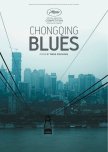
A visual piece of film.
From Asian latitudes, Chinese director Wang Xiaoshuai serves serious family drama with the classic father figure at the center. Although heavy on symbols, it is coolly performed, well played and a whole that feels magnificently composed.The points of contact are many and emotional as Father Lin returns to the family he once abandoned. His son has died in a hostage drama and the loose ends of the past are exacting their toll.
Absent fathers, also known as the ultimate pigs, have long been a constant companion. It seems we all suffer from the loss that only an absent father's embrace can cause and the question looms, are all fathers pigs? The setup here is already clear and rather it is about a human exploration in the art of abandonment.
In this way, Chongqing Blues is far from an innovative film, possibly more sigh-inducingly boring. But despite many prejudices, this is a beautiful film, not only on the surface but also in content. Admittedly heavy on symbols where Xiaoshuai seems to want us to read way too much into a look, movement or thing, bordering on sentimentally careless but by all means, it works.
The portrait of the father who has left his wife and child is brilliantly done by Wang Xueqi as he tries lostly to collect the rubble of a life. Neither over-the-top nor explosive, a strong ensemble overall succeeds in conveying a touching story through deep if not always long-lasting characters.
The visual composition is very similar to the narrated core of the film. The further you get, the more impressive becomes Xiaoshuai's slickness in terms of cutting and eye for picture details. The cross-cut flashbacks in particular send pleasant shivers through any movie buff.
And the interest in a not entirely original film is sustained by concrete content. It is thoughtful and purports to be an exploration into parenting and confession. It will hardly be to everyone's taste, Asian father drama, that goes without saying, but Chongqing Blues is a visual piece of film that is worth your time and attention.
Was this review helpful to you?
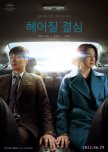
Masterpiece cast in silky noir.
The ultra-violence of the revenge trilogy feels distant when the Korean visionary Park Chan Wook serves delicious romance of the absolute highest class.The irresistible scent of classic noir hangs like a dense fog over Park Chan Wook's latest opus. Decision to Leave (2022) undeniably has films like Double Indemnity (1944) and Vertigo (1958) to thank, but at the same time, Park Chan Wook is refreshingly unique in his filmmaking and voice as usual. It is not long before what is initially very "Hitchcockian" and familiar is taken in completely unexpected directions.
The story begins in an accident investigation led by the chronically melancholic police officer Jang Hae Joon (Park Hae Il). A middle-aged climber appears to have fallen from the mountain he was climbing and died instantly when he hit the ground. Most of Hae Joon's colleagues shrug their shoulders and want to shrug it off as quickly as possible, while he himself begins to turn the magnifying glass on the deceased's mysterious widow, Chinese Song Seo Rae (Tang Wei). Her cold nonchalance about what happened and her murky background means that Hae Joon is no longer so sure that her fate was an accident. The instant chemistry that develops between the two further complicates the case.
So far it feels like movies I've seen before but every minute of playtime me further away from them. What could steer towards a conventional investigative thriller instead becomes something far more dreamy and sublime. What generally results in something cold and hard instead turns into something warm and silky. With each passing scene, it becomes increasingly clear that the murder mystery and its "whodunit" question is completely subordinate to the central relationship and that it is a love story unfolding on the big screen, albeit a strange one. The corpses that keep turning up are just icing on a cake of passion and longing. Park Chan Wook's transformation into bloody romantic (something already noticed in 2016's The Handmaiden) is total, and I love it.
Given that's the direction Park Chan Wook chooses, it's Tang Wei and Park Hae Il that everything hinges on, because if you don't buy their almost Phantom Thread twisted romance, everything else falls like a house of cards. Fortunately, there are sparks about them from the first frame they share and it is with ease that one capitulates to their restrained "courtship" of each other. Hae Il's portrayal of someone stuck on autopilot in career and marriage only to gently thaw back to life is utterly devastating, and Tang Wei's multi-layered, vulnerable and utterly unique femme fatale interpretation will carry with me for a long time.
As always with Park Chan Wook's filmmaking, he maximizes the visual potential of every frame. Here he is more playful than in his previous works and allows everything from smartphones to GPSs to merge with the visual language and the result feels as hypermodern as it does classic. Aesthetically, he continues on the trail he opened with 2018's The Little Drummer Girl, allowing both set design and costuming to rise far beyond realism. There are strong reds, strong blues and strong greens, almost to the point that Pedro Almodóvar feels like a possible source of inspiration. Few filmmakers can pull off a visual feast of this breathtaking caliber.
When the incredible finale (incidentally the obvious peak of a film that conquers the epithet masterpiece in every scene) is over and the credits roll, I can't help but think of Michael Gambon's narration in the Coen brothers' Hail, Caesar! (2016) and how he describes a film- "A potion of balm for the ache of a toiling mankind". That's exactly what Decision to Leave is, a soft and healing balm for the heart, brain and soul.
Was this review helpful to you?
























